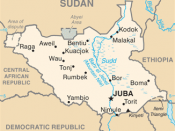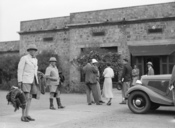To intervene or not to intervene, the case of South Sudan.
In an intercontinentally- sustained broadcasted referendum in December 2013, South Sudan gained independence from Sudan, erupted violence has been a cause among key leaders in South Sudan due to growing political tensions. The violence, has transpired amongst civilians loyal to former Vice President Riek Machar and the rebels and has initiated humanitarian and sanctuary emergency that could be hauling another civil war in the world's newest country (Nyheim, 2008:7). While ethnic identity was not a clear cause of the diplomatic disagreement that prompted this predicament, it however coincided with ethnic criticisms and pre-existing political that prompted targeted killings of ethnicity in Juba armed clashes and then beyond the capital city. The aim of this essay is to examine the framework of the International Committee of the Red Cross (ICRC) intervention in South Sudan. This essay will firstly discuss the brief history of the conflicts emergence, secondly it will outline how ethic violence has affected the people of South Sudan and made them vulnerable, thirdly discuss how the ICRC has intervened in-terms of reconnecting separated families, providing emotional support, first aid, distribution of relief items and hygiene promotion, and lastly conclude by where other states and organisations stand on the problem.
Although in January 2014 discussions concerning the two parties began, to date, however minimal progress has continued, as both sides engage in violent operations to gain and hold ground. According to (van der Zwan, 2011:11), reports show irregular collisions between forces loyal to the former deputy Riek Machar, an ethnic Nuer and president, Salva Kiir, an ethnic Dinka although pursuing to make the best use of their negotiating position preceding to any cessation of hostilities agreement. Since the Comprehensive Peace Agreement (CPA) was signed in 2005, there has however...


